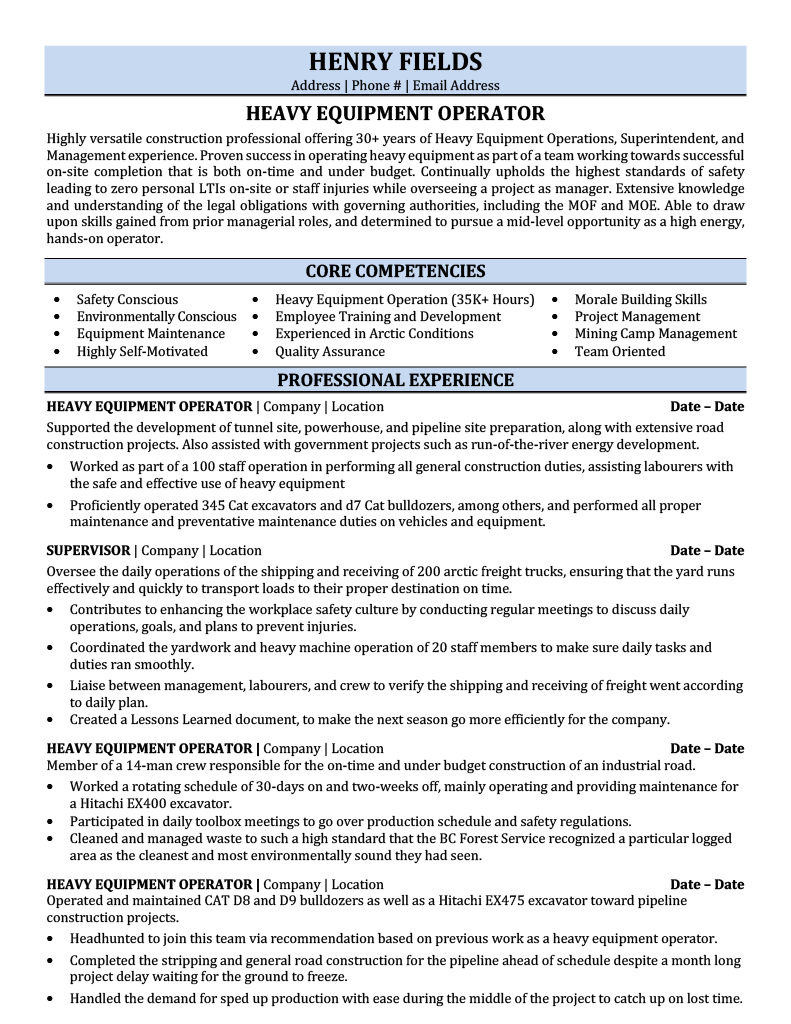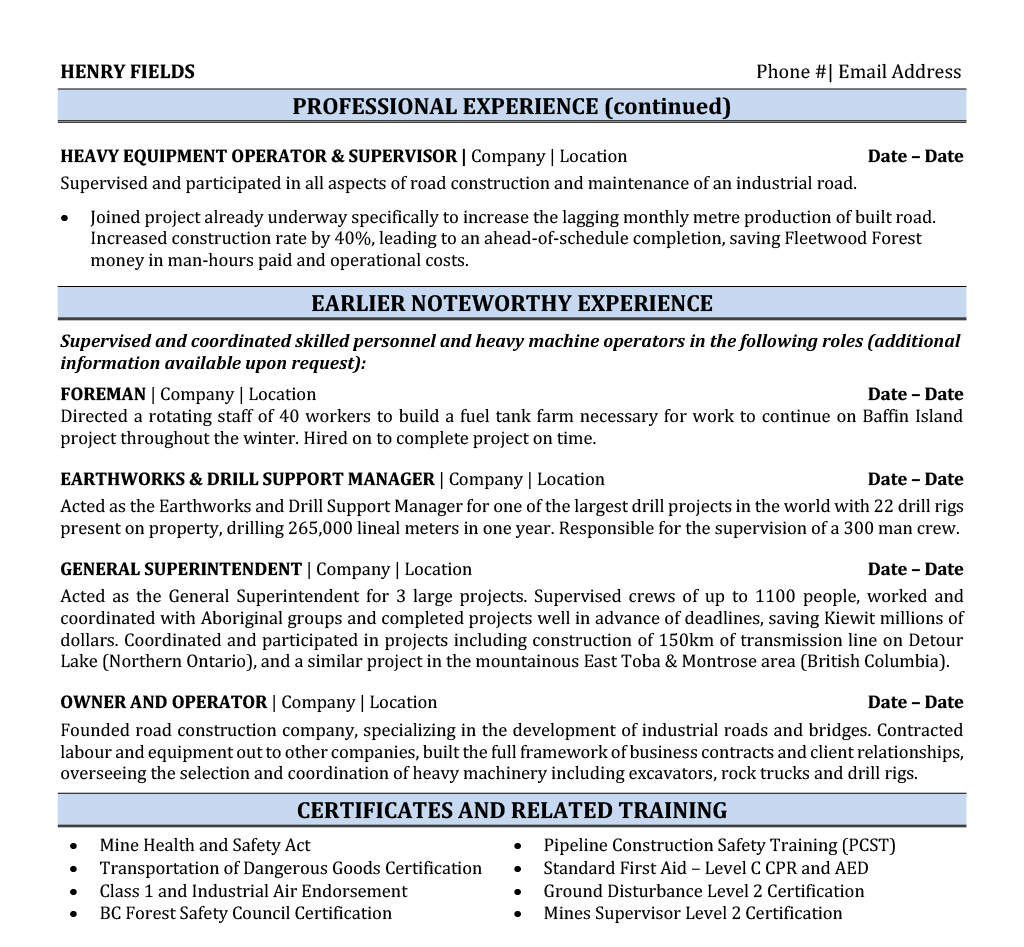

Moving mountains is your daily job, but moving your career forward takes a different kind of heavy lifting. Getting your skills and achievements onto paper can feel like operating a crane without controls.
Are you struggling to show employers the full scope of your equipment expertise? Your resume needs to demonstrate both technical mastery and proven reliability, turning complex machinery experience into compelling qualifications.
At Resume Target, we understand how to translate your hands-on expertise into powerful credentials. We help heavy equipment operators showcase their technical abilities, safety records, and project successes in language that hiring managers value.


At the controls of machines that can weigh up to several tons, heavy equipment operators are the skilled professionals who literally shape our world, transforming raw terrain into highways, buildings, and bridges that connect communities.
These specialized operators combine precise technical skills with spatial awareness to maneuver massive machinery like excavators, bulldozers, and cranes, coordinating complex movements while maintaining constant communication with ground crews to ensure safety and accuracy on construction sites.
If you're interested in joining this dynamic field, you'll discover a career path that offers both hands-on experience and opportunities for advancement, from entry-level operator positions to specialized roles operating increasingly complex machinery or even moving into construction management.
Let's talk about your earning potential as a heavy equipment operator! Your skills in operating complex machinery and contributing to major construction projects can lead to an exciting career with competitive compensation. The field offers multiple paths for growth, and your earnings can increase significantly as you gain expertise and specializations.
Figures from: U.S. Bureau of Labor Statistics
Start your journey as an apprentice and climb to leadership positions through hands-on experience and certifications. Heavy equipment operators can advance from basic machinery operation to managing entire construction fleets.
Beyond basic machine operation, your success depends on combining technical expertise with strong interpersonal abilities to ensure safe and efficient project completion.
- Equipment maintenance and troubleshooting - Multi-machine operation proficiency - Safety protocol management - Team leadership and communicationBreak into heavy equipment operation by starting as a trainee operator, where you'll learn essential machine operations while earning certifications and gaining hands-on experience under experienced mentors.
To advance in your heavy equipment operation career, you'll need to develop key soft skills, including communication and teamwork skills that enhance safety and efficiency on every job site.
Requirements from NCCER
Construction booms and infrastructure projects drive demand across both coastal and central states, with top opportunities in engineering and specialty trades.
Figures from Zippia
Struggling to put your years of machinery expertise, safety records, and project accomplishments onto paper in a way that truly showcases your skills as a heavy equipment operator? This comprehensive, section-by-section guide will walk you through exactly how to build a powerful resume that highlights your hands-on experience and technical capabilities.
As a heavy equipment operator, you know how to handle complex machinery with precision, but summarizing your career on paper can feel more challenging than maneuvering a 30-ton excavator.
While you excel at operating dozers, loaders, and excavators with expert-level control, translating those hands-on skills and safety-focused mindset into compelling resume language often leaves even the most experienced operators struggling to showcase their true value to hiring managers.
How would you describe your equipment expertise and versatility across different types of heavy machinery in one compelling statement?
Reason: Opening with your range of equipment proficiency immediately establishes your core value as an operator and shows potential employers the breadth of your capabilities.
What combination of safety record, certification credentials, and years of experience best captures your professional identity as a heavy equipment operator?
Reason: Safety and credentials are fundamental in this industry, and combining these elements helps create a powerful professional snapshot that employers look for first.
How have your adaptability and technical skills contributed to your effectiveness across different work environments (construction, mining, infrastructure projects)?
Reason: Highlighting your ability to perform across various work settings demonstrates versatility and broad industry understanding, making your summary more appealing to different types of employers.
As a heavy equipment operator, your skills section needs to showcase both your hands-on machine operation expertise and your understanding of safety protocols and maintenance procedures.
From operating complex machinery like excavators and bulldozers to maintaining daily inspection logs and following OSHA guidelines, your resume should highlight both technical capabilities and essential workplace competencies.
Showcase your expertise operating complex machinery by organizing your experience into three powerful sections: a concise role overview highlighting your equipment specialties, measurable achievements that demonstrate your efficiency and safety record, and core responsibilities that spotlight your technical capabilities.
Many heavy equipment operators struggle to translate their daily operational expertise into compelling achievements that catch hiring managers' attention. Transform your hands-on experience into powerful metrics by highlighting safety records, productivity improvements, and equipment maintenance savings that directly impact the bottom line.
Your responsibilities section demonstrates how you safely and efficiently operate complex machinery while contributing to project success. This section should translate technical operating skills into clear achievements that show managers how you impact project timelines, safety records, and operational efficiency.
Your heavy equipment certifications and training are crucial for demonstrating your operational expertise and safety awareness to potential employers. Focus on listing your most current licenses and certifications first, especially those relevant to the specific equipment you'll be operating, like excavators, bulldozers, or cranes.
Now that you've built a strong foundation using Resume Target's proven resume writing guidelines, you're ready to take your heavy equipment operator resume to the next level.
While many operators focus solely on customizing their cover letters, tailoring your resume for each specific heavy equipment position is what truly sets successful candidates apart in this competitive field.
A customized resume not only helps you bypass automated ATS filters by incorporating the right keywords, but it also shows hiring managers that your specific equipment certifications, safety record, and operational expertise align perfectly with their needs.
Ready to transform your resume into your most powerful job-hunting tool? Let's make sure your experience with specific machinery and safety protocols stands out exactly where employers are looking for it!
Don't let a lack of professional experience stop you from pursuing your career as a Heavy Equipment Operator!
Your resume can showcase your potential by highlighting relevant training certifications, hands-on practice during vocational programs, and any equipment-related projects you've completed.
Focus on emphasizing your safety awareness, mechanical aptitude, and any equipment-specific training you've received.
For more guidance on structuring your resume, check out the Student Resume Writing Guide to help you highlight your most relevant qualifications.
Your entry-level heavy equipment operator resume summary is your chance to showcase relevant certifications, training programs, and hands-on experience from vocational education or apprenticeships.
Focus on highlighting your safety consciousness, mechanical aptitude, and any equipment-specific training you've completed to demonstrate your readiness for the role.
"Detail-oriented and safety-focused Heavy Equipment Operator with certification from ABC Technical Institute and 200+ hours of supervised equipment operation experience. Proficient in operating bulldozers, excavators, and front-end loaders while maintaining perfect safety record during training. Completed OSHA safety certification and demonstrated expertise in equipment maintenance protocols. Seeking to leverage strong mechanical aptitude and commitment to safety excellence in an entry-level heavy equipment operator position."
Now's your chance to showcase the valuable training and certifications that make you a qualified heavy equipment operator - don't hold back on highlighting those specialized courses and hands-on learning experiences!
Transform your education section into a powerful snapshot of your expertise by featuring relevant coursework like "Advanced Excavator Operations"or "OSHA Safety Certification,"along with any equipment-specific training programs you've completed.
The names of courses common to a degree/certification for Heavy Equipment Operators include: Introduction to Safety, Basic Communication Skills, Basic Employability Skills, Heavy Equipment Safety, Identification of Heavy Equipment [5], Backhoe Loader, Dozer, Motor Grader, Front End Loader, Excavator [2], Certificate of Heavy Equipment Operations - Level I, Certificate of Heavy Equipment Operations - Level II, Horizontal Directional Drilling, Mobile Crane, Tower Crane, Lattice Boom Crawler Crane, Fixed Cab Crane Operation with Rigging and Signaling, and Associate of Occupational Science in Heavy Equipment [6].Relevant Coursework: Heavy Equipment Safety | Basic Employability Skills | Backhoe Loader Operations | Dozer Operations | Motor Grader Techniques | Excavator Fundamentals
Key Projects:
Construction Site Simulation Project: Led a comprehensive site grading project using multiple pieces of heavy equipment to achieve precise elevation requirements within specified tolerances.
Infrastructure Development Training: Participated in a collaborative road construction project focusing on proper equipment coordination and soil compaction techniques.
Leverage your training certifications, hands-on experience, and safety knowledge to create a compelling skills section that showcases your readiness to operate construction machinery safely and efficiently.
As an entry-level Heavy Equipment Operator, your foundation in safety practices and basic machinery operation positions you well for a field that continues to grow with infrastructure development and construction projects nationwide.
Let's face it - trying to capture years of hands-on experience and specialized equipment expertise on paper can feel like trying to park a crane blindfolded. When every project and machine brings unique challenges, how do you showcase your real-world skills in a way that hiring managers understand?
At Resume Target, we've mastered the art of translating complex Oil and Gas equipment operation experience into powerful career documents that get results.
Our team has helped countless heavy equipment operators showcase their expertise with specific machinery, safety records, and project impacts in ways that make hiring managers take notice.
With major infrastructure projects ramping up across the Oil and Gas sector, now is the perfect time to upgrade your resume - let's connect today to position you for these emerging opportunities.
Impress any hiring manager with our Oil & gas resume writing service. We work with all career levels and types of Oil & gas professionals.
Learn More → Oil & gas Resume Writing Services